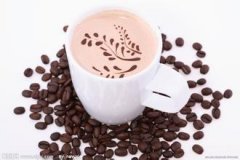Drinking more coffee is good for your health. Is it appropriate to drink 600 milliliters a day?

For years, coffee has been known to be bad for your health, bad for your heart, bad for your stomach, and even cause cancer. On the 13th, scientists from many countries said at the ongoing International Coffee Science Association conference that all kinds of prejudice against coffee in the past were unfair. Not only that, coffee can actually reduce the risk of Parkinson's disease or diabetes.
Many scientists believe that for a healthy coffee lover, drinking six cups of coffee a day will not cause damage to the heart or digestive system. However, for nearly two centuries, coffee research has been limited to caffeine, which has led to some misunderstandings.
Researchers at the Mario Negri Institute of Pharmacology in Milan, Italy, said coffee reduced the risk of sclerosis by 80 percent. Coffee may protect men from Parkinson's disease, said Fred Holm, a researcher at Sweden's Karolinska Institute. Researchers at the Vienna Medical School say coffee is more effective than fruits and vegetables in preventing DNA oxidation. DNA oxidation is the root cause of a number of serious diseases, especially cancer.
Tumiletto, a diabetes expert at the University of Helsinki, said that as long as a person drinks five to six cups of coffee a day, the incidence of type 2 diabetes can be halved. Drinking 10 cups of coffee a day reduced the risk of type 2 diabetes by 80%. Finns are the world's biggest coffee drinkers, and it's not unusual for a person to drink 10 cups a day.
Is it appropriate to drink 600 ml per day? Although the researchers wanted to advise people on how much to drink in moderation, they didn't say what kind of coffee a person should drink, how often, or how to drink it. The scientific results presented at the conference were based on American-style coffee cups, and it is generally believed that drinking 600 ml of coffee a day is considered a reasonable amount.
Epidemiologists at Utrecht University Medical Center in the Netherlands studied the heart attack risk of coffee drinkers. Based on current knowledge, he believes, a coffee drinker can continue drinking coffee to his heart's content without causing harm to his health. But he also didn't name a suggested number. "It's difficult to translate observations into medical advice," he said.
Important Notice :
前街咖啡 FrontStreet Coffee has moved to new addredd:
FrontStreet Coffee Address: 315,Donghua East Road,GuangZhou
Tel:020 38364473
- Prev

The study found that drinking coffee in the morning is better than drinking juice.
A cup of coffee in the morning may be better than a cup of sugary juice, at least for the high-profile type 2 diabetes, a new study has found. The exact reason why coffee reduces the risk of diabetes is unclear, but one possibility is that certain ingredients such as magnesium or chlorogenic acid in coffee improve the body's ability to regulate blood sugar. In addition, the effect of caffeine on metabolism
- Next

Return to the Cafe-Science + Cafe
It is a bold and wonderful way to let science out of the ivory tower and into the cafe, which is far from the atmosphere of the traditional academic environment. Why graft science with the cafe? Return to Cafe Science + Cafe =? Wen he Photography / Master Chen Gang said: we want our guests to be interested and free to explore the latest science and technology while tasting coffee or tea.
Related
- Beginners will see the "Coffee pull flower" guide!
- What is the difference between ice blog purified milk and ordinary milk coffee?
- Why is the Philippines the largest producer of crops in Liberia?
- For coffee extraction, should the fine powder be retained?
- How does extracted espresso fill pressed powder? How much strength does it take to press the powder?
- How to make jasmine cold extract coffee? Is the jasmine + latte good?
- Will this little toy really make the coffee taste better? How does Lily Drip affect coffee extraction?
- Will the action of slapping the filter cup also affect coffee extraction?
- What's the difference between powder-to-water ratio and powder-to-liquid ratio?
- What is the Ethiopian local species? What does it have to do with Heirloom native species?

